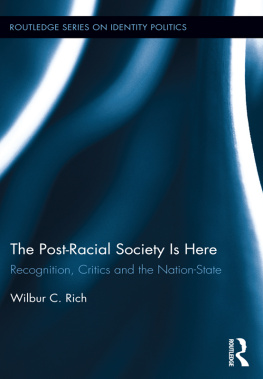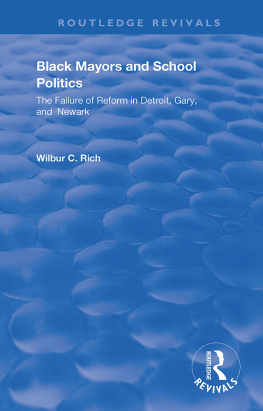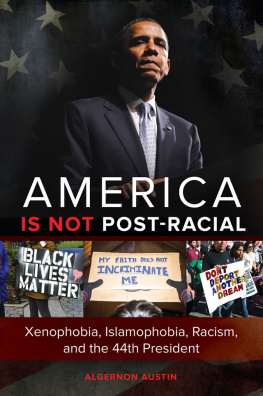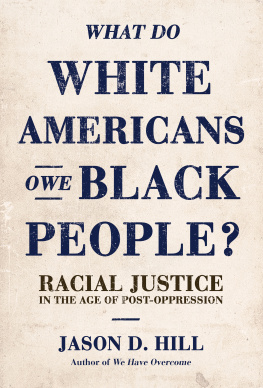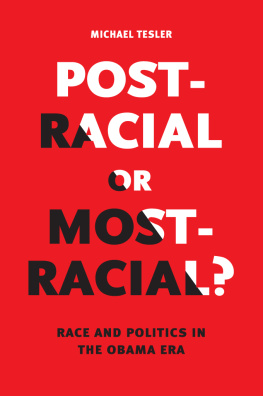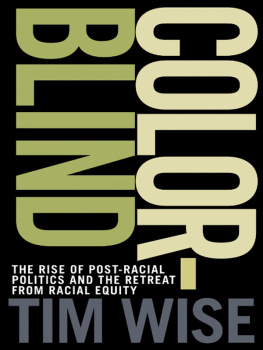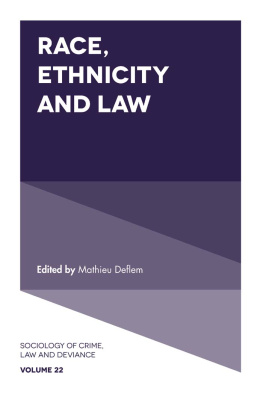This work throws light, as no other has, on the evolution of race in American political and social systems. Wilbur Rich has written a sweeping and probing account of the rise and withering away of our nation's race-based society. Readers will find this book both informative and provocative.
Marion Orr, Brown University
Wilbur Rich has constructed an important, remarkably thoughtful and in novate analysis of the post-racial society that is now upon us. His analyses are fresh and discerning, and there is every reason to believe that The Post-Racial Society is Here will quickly be acknowledged as a uniquely discerning and revelatory integration of societal forces. They have never before been addressed as an integrated whole as Rich does by so adeptly weaving together a fascinating fabric: politics and economics, race and class, language and semantics, leadership and coalitions, cultural capital and collective responsibility. His insights are both descriptive and prescriptive. Rich's work is an especially valuable and substantive guide toward a post-racial discourseeclipsing the stereotypes, simple solutions and common assumptions that now characterize this dialogue.
Marc Holzer, Rutgers University
The Post-Racial Society Is Here
In a provocative and controversial analysis, Wilbur C. Richs The Post-Racial Society Is Here conclusively demonstrates that the nation is in the midst of a post-racial society. Yet many Americans are skeptical of this fundamental social transformation. The failure of recognition is related to the remnants of the previous race-based society. Recognizing the advent of a post-racial society is not to gainsay recurrent racial incidents or deny the socioeconomic gap between the races.
Using the findings of historians and social scientists, this book outlines why the construction and deconstruction of the race-based society was such a difficult and daunting enterprise. Starting from the nation's inception, Rich examines how the national elites used racial language, separate schools, and the media to divide Americans. After World War II, the nation used US Supreme Court rulings and the Congressional passage of civil rights laws to dismantle the institutional support for racial segregation and discrimination. The black civil rights movement facilitated and consolidated the movement toward sociopolitical inclusion of African Americans. Rich alerts the reader to the unprecedented progress made and why the forces of the new global economy demand that we move faster to make society more inclusive. This thought-provoking book should interest scholars of Africana studies, American studies, African American politics and sociology.
Wilbur C. Rich is the William R. Kenan Jr. Professor of Political Science (emeritus) at Wellesley College. His primary areas of research are urban politics, public policy and school politics. Rich has served as president of the Northeastern Political Science Association (19992000), president of the Urban Section, American Political Science Association (20062007); and president of the New England Political Science Association (20082009). He is a member of the American Society for Public Administration, Urban Affairs Association, American Educational Research Association, Eastern Educational Research Association, Eastern Communication Association and the National Conference of Black Political Scientists.
Routledge Series on Identity Politics
Series Editor: Alvin B. Tillery, Jr., Rutgers University
Group identities have been an important part of political life in America since the founding of the republic. For most of this long history, the central challenge for activists, politicians, and scholars concerned with the quality of U.S. democracy was the struggle to bring the treatment of ethnic and racial minorities and women in line with the creedal values spelled out in the nation's charters of freedom. We are now several decades from the key moments of the twentieth century when social movements fractured America's system of ascriptive hierarchy. The gains from these movements have been substantial. Women now move freely in all realms of civil society, hold high elective offices, and constitute more than 50 percent of the work-force. Most African-Americans have now attained middle class status, work in integrated job sites, and live in suburbs. Finally, people of color from nations in Latin America, Asia, and the Caribbean now constitute the majority of America's immigration pool.
In the midst of all of these positive changes, however, glaring inequalities between groups persist. Indeed, ethnic and racial minorities remain far more likely to be undereducated, unemployed, and incarcerated than their counterparts who identify as white. Similarly, both violence and work place discrimination against women remain rampant in U.S. society. The Routledge series on identity politics features works that seek to understand the tension between the great strides our society has made in promoting equality between groups and the residual effects of the ascriptive hierarchies in which the old order was rooted.
Some of the core questions that the series will address are: how meaningful are the traditional ethnic, gender, racial, and sexual identities to our understanding of inequality in the present historical moment? Do these identities remain important bases for group mobilization in American politics? To what extent can we expect the state to continue to work for a more level playing field among groups?
| Titles in the Series: |
| 1 | Black Politics Today |
| The Era of Socioeconomic Transition |
| Theodore J. Davis Jr. |
| 2 | Jim Crow Citizenship |
| Liberalism and the Southern Defense of Racial Hierarchy |
| Marek Steedman |
| 3 | The Politics of Race in Latino Communities |
| Walking the Color Line |
| Atiya Kai Stokes-Brown |
| 4 | Conservatism in the Black Community |
| To the Right and Misunderstood |
| Angela K. Lewis |
| 5 | The Post-Racial Society is Here |
| Recognition, Critics and the Nation-State |
| Wilbur C. Rich |
First published 2013
by Routledge
711 Third Avenue, New York, NY 10017
Simultaneously published in the UK
by Routledge
2 Park Square, Milton Park, Abingdon, Oxon OX14 4RN
Routledge is an imprint of the Taylor & Francis Group,
an informa business
2013 Taylor & Francis
The right of Wilbur C. Rich to be identified as author of this work has been asserted by him in accordance with sections 77 and 78 of the Copyright, Designs and Patents Act 1988.
All rights reserved. No part of this book may be reprinted or reproduced or utilised in any form or by any electronic, mechanical, or other means, now known or hereafter invented, including photocopying and recording, or in any information storage or retrieval system, without permission in writing from the publishers.
Trademark Notice: Product or corporate names may be trademarks or registered trademarks, and are used only for identification and explanation without intent to infringe.
Library of Congress Cataloging in Publication Data

